- Home
- Kristin Harmel
The Sweetness of Forgetting Page 16
The Sweetness of Forgetting Read online
Page 16
“It was love at first sight, something I have never seen before or since,” Alain continues. “I would not believe in it if I had not seen it for myself. But from the very first moment, it was as if they had found the other half of their souls.”
As corny as it sounds, there’s something in the gravity of Alain’s voice that makes me believe him.
“Jacob was with us always from that first moment,” Alain continues. “My father did not care for him, for he was from a lower class. My father was a doctor, while Jacob’s father was a factory laborer. But Jacob was kind, polite, and intelligent, so my parents tolerated him. He was always taking the time to teach me things, and to play with David and Danielle.”
Alain pauses, and I imagine he’s thinking about his little brother and sister, lost so long ago. We stroll in silence for a while, and I wonder what it’s like to entirely lose one’s innocence at such a young age, to never be able to retrieve it. We pass the Hôtel de Ville, Paris’s palatial city hall, which is bathed in pale light. Alain takes my hand as we cross the street, and as we make our way north into the Marais, he doesn’t let go. I realize I don’t want him to. I’ve been missing a family too, now that my mother is gone and my grandmother’s memory has all but vanished.
“When the anti-Jewish laws began being imposed, and as things became worse for us, Jacob began to become more vocal about his opposition to the Nazis, and my parents were concerned,” Alain continues. “My father, you see, wanted to believe that we would be immune, because we were wealthy. He wanted to believe that people were blowing everything out of proportion, that the Nazis did not truly intend us harm. Jacob, on the other hand, understood exactly what was happening. He was part of an underground movement. He believed the Nazis were coming to erase us all from the face of the earth. He was right, of course.
“I look back now, and I wonder why my parents could not see things more clearly,” Alain says. “I think they didn’t want to believe that our country could turn its back on us. They wanted to believe the best. And when Jacob spoke the truth, they would not hear it. My father was outraged and accused him of bringing lies and propaganda into our home.
“Rose and I were the only ones who believed him.” Alain’s voice is hollow, almost a whisper. “And that is what saved us both.”
We walk in silence for a little while more. Our footfalls echo off the stone walls around us.
“Where’s Jacob now?” I ask finally.
Alain stops in his tracks and looks at me. He shakes his head. “I do not know,” he says. “I do not know if he is still alive.”
My heart drops in my chest.
“The last time we spoke was 1952, when Jacob set off for America,” Alain says.
I stare at him. “He moved to America?”
Alain nods. “Yes. I don’t know where in America. But of course that was nearly sixty years ago. He would be eighty-seven now. It’s very possible he is not alive anymore. Remember, he spent two years in Auschwitz, Hope. That takes a toll.”
I don’t trust myself to speak until we arrive back at Alain’s building. I can’t fully wrap my mind around the idea that my grandmother and the apparent love of her life have been living in the same country for sixty years and never knew the other had survived. But if Jacob had found her during the war, my mother might never have been born, and of course I wouldn’t have been either. So had things worked out the way they were supposed to? Or was my very existence a slap in the face of true love?
“I have to try to find him,” I say as Alain punches his code into the keypad to the right. He holds the door open for me.
“Yes,” he agrees simply.
I follow him up to his apartment. I feel like I’m in a fog.
“Shall we call Rose again now?” he asks once he’s locked the door behind us.
I nod again. “But remember, she has good days and bad ones,” I remind him. “It’s very possible that she won’t understand who you are. She’s different than she used to be.”
He smiles. “We’re all different than we used to be,” he says. “I understand.”
I check my watch. It’s nearly ten, so it would be nearly four on the Cape, late enough in the day that Mamie is probably sundowning; it’s common for dementia patients to be less lucid as the day wears on. “You sure you don’t mind if I call from your phone?” I ask. “It’s expensive.”
Alain laughs. “If the cost were a million euros, I would still say yes.”
I smile, pick up the receiver, and punch in 001, then Mamie’s number. I listen to the line ring six times before I hang up. “That’s strange,” I say. I check my watch again. Mamie doesn’t participate in the social activities at her home—she says bingo is for children—so there’s no reason she shouldn’t be in her room. “Maybe I dialed wrong.”
I try again, and this time, I let it ring eight times before I hang up. Alain is frowning at me, and although there’s a bad feeling in the pit of my stomach, I force a smile. “She’s not answering, but maybe my daughter took her out for a walk or something.”
Alain nods, but he looks concerned.
“Do you mind if I try her?” I ask. “My daughter?”
“Of course,” Alain says. “Please.”
I dial 001 and then Annie’s cell number. She picks up after half a ring. “Mom?” she asks, and I can tell from her voice that something’s wrong.
“What is it, honey?” I ask.
“It’s Mamie,” she says. Her voice is trembling. “She . . . she had a stroke.”
My heart stops, and I look up at Alain, stunned. I know he can read everything on my face.
“Is she . . . ?” I ask. I don’t complete the sentence.
“She’s in the hospital,” Annie says. “But she’s not doing good.”
“Oh my God.” I look up at Alain, who looks panicked.
“What has happened?” he asks.
I cover the receiver with my hand and say, “My grandmother had a stroke. She’s in the hospital.”
Alain puts a hand over his mouth as I turn my attention back to my daughter. “Honey, are you okay?” I ask. “Who’s with you?”
“Mr. Keyes,” she mumbles.
“Gavin?” I ask, confused. “But where’s your dad?”
“Still at work,” she says. “I—I tried to call him. But his assistant said he was in the middle of an important case. She said he’d call me when court was in recess.”
I close my eyes and try to breathe. “I’m so sorry I’m not there with you, honey. I’m coming home as soon as I can. I promise.”
“I tried calling you at your hotel,” Annie says in a small voice. “Where were you?”
I look up at Alain, who has tears in his eyes.
“I have a lot to tell you, Annie,” I say. “I’ll tell you as soon as I get home, okay?”
“Okay,” she says in a small voice.
“Can I talk to Gavin for a minute?”
She doesn’t answer, but I hear a rustling as she passes the phone to him. “Hello?” he says a moment later, and it’s not until I hear his voice that I release a breath I didn’t realize I’d been holding.
“Gavin, what happened?” I ask right away. I know I should begin by thanking him for once again coming to my rescue, but all I can think about is Mamie, and how Annie is coping.
“Hope, your grandmother had a stroke, but they’ve stabilized her,” he says, and his voice is all business, but there’s a gentleness there that soothes me. “She hasn’t regained consciousness, but they’re monitoring her. It’s too soon to tell how much damage there’s been.”
“How . . . what . . . ?” My voice trails off, because I don’t know what I’m trying to ask. I look up at Alain helplessly again. He’s sunk into a chair opposite me and is watching with watery eyes. His gnarled hand is still over his mouth. “How did you know?” I finally ask.
“Annie called,” Gavin explains quickly. “She was at her father’s house. I guess your grandmother’s assisted living place still had you
r old home number as one of the emergency contacts, so a nurse called there, and Annie answered. She couldn’t reach anyone to take her to the hospital, so she called me.”
“I’m sorry,” I mumble. “I mean, thank you.”
“Hope, don’t be silly,” Gavin says. “I was happy to help Annie out. I’m glad she called. I was just down the street, actually, finishing up a repair job at Joan Namvar’s cottage, so I was able to come get her right away.”
I close my eyes. “Thank you, Gavin. I don’t even know how to thank you enough.”
“It’s fine,” he says dismissively.
“Is she okay?” I ask. “Annie?”
“She’s okay,” he says. “Shaken up, but okay. Don’t worry; I’ll stay with her until your ex gets out of work.”
“Thank you,” I whisper. “I’ll make it up to you, Gavin.”
“Don’t worry,” he repeats.
I take a deep breath. “I’ll be on the next available flight.” I’m not good at accepting favors from people, and I know that the guilt from this one will weigh on me for a long time.
“Hope, are you okay?” Gavin asks.
I blink a few times. No one ever asks me that. “Yeah,” I say, but it’s a lie. “Can I talk to Annie again?”
“Sure,” Gavin says. “Hang in there. See you soon.”
I hear a rustling again, and then Annie’s on the line. “Mom?” she asks.
“Listen, I’m sorry about your dad,” I say. “I’m going to call him right now and make sure that—”
“I’m fine, Mom,” Annie interrupts. “Mr. Keyes is with me.”
I sigh and pinch the bridge of my nose. “I’ll be there as soon as I can, sweetheart,” I say.
“I know,” Annie says.
“I love you, honey.”
There’s a pause. “I know,” Annie says again. But then she adds, “I love you too.”
It’s only then that I begin to cry.
Alain calls all the airlines while I struggle to get myself under control. I pace his apartment, feeling like a caged animal. For the thousandth time, I visualize Annie crying in the waiting room with no one there to comfort her except Gavin Keyes. He’s been wonderful to us these last few months, but still, she doesn’t know him that well and she must be scared about Mamie. Her father should be there with her, not Gavin. As soon as Alain gets off the phone, I plan to call Rob and give him a piece of my mind.
“I switched your ticket,” Alain tells me when he finally hangs up, “and I bought one for myself. The earliest nonstop I could get for us was 1:25 p.m., arriving in Boston just after three. There were early flights from Paris, but with the stops, they would have gotten us into Boston later.”
I blink and nod; 1:25 p.m. tomorrow feels like an eternity from now. “Thank you,” I say. “How much do I owe you?” I know I shouldn’t be thinking about money now, but I’m aware that the cost will be much more than the thousand-dollar check Mamie gave me. I have no idea how I’ll pay for this.
Alain looks confused. “Do not be crazy,” he says. “This is not a time to talk about such things. We must get to Boston quickly to see Rose.”
I nod. I’ll insist later. I don’t have the energy right now. “Thank you,” I say softly.
I ask Alain whether I can use his phone once more, and he watches me carefully as I speak first to Rob’s assistant and then, after I persuade her to put me through, to Rob, my voice taut with tension.
“Jesus, Hope, I’ll get there as soon as I can,” Rob says. “I’m in the middle of an important hearing. It’s not like Annie’s life is in danger or something.”
“Your daughter is at the hospital, alone and scared,” I say through gritted teeth. “That doesn’t matter to you?”
“I said I’ll get there as soon as I can,” he repeats.
“Yeah, I heard you the first time,” I retort. “And it sounded just as selfish then.”
As I place the receiver down, I realize I’m shaking. Alain crosses the room and hugs me. I hesitate for a moment, then hug back.
“You are not married to the father of Annie?” Alain asks after a moment, and I realize that for all the talking we’ve done about Mamie, I’ve barely told him anything about myself.
“No,” I say. “Not anymore.”
“I am sorry,” Alain says.
I shrug. “Don’t be,” I say. “It’s for the best.” I’m trying to sound more lighthearted and casual about it than I feel. But I can tell, from the look on Alain’s face, that he sees right through my nonchalance. I’m grateful that he doesn’t ask anything else.
“You are welcome to stay here tonight if you wish,” Alain says. “But I think you have things at your hotel that you need to retrieve.”
“Yeah, I have to pack,” I say numbly. “And check out.”
“I will not sleep tonight,” Alain says. “There are too many things in my mind. So please return when you would like in the morning. There is no time too early. We will have breakfast together before we leave for the airport.”
I nod. “Thank you,” I murmur.
“Thank you,” Alain says. He squeezes my hands and kisses me on both cheeks. “You have given me my family back.”
I can’t sleep that night either, although I try. I feel ashamed to be crawling under the covers while my daughter is alone and scared thousands of miles away. I try Annie twice more, but she doesn’t answer; her phone goes straight to voice mail, and I wonder whether the battery has run out. Around four in the morning Paris time, I reach Gavin on his cell, and he tells me that he left when Rob got to the hospital around seven in the evening. As far as he knows, there’s been no change in Mamie’s condition since then.
“Try to get some rest, Hope,” Gavin says softly. “You’re coming home as soon as you can. And you’re not helping anyone by lying there awake right now.”
I mumble a thank-you and hang up. The next thing I know, I’m staring at a clock that tells me it’s five forty-five in the morning. I don’t remember falling asleep.
I’m at Alain’s by seven, after showering, shoving the remainder of my things into my duffel bag, checking out, and hailing a cab outside the hotel.
Alain is already dressed for our trip, in slacks and a button-down shirt with a navy tie, when he greets me at his door. He kisses me on both cheeks and embraces me. “You did not sleep much either, I see,” he says.
“Barely.”
“Come in,” he says, stepping aside. “My friend Simon is here. He knew our family before the war. And my friend Henri. He is a survivor too. They want to meet you.”
My heart is in my throat as I follow Alain into his apartment. In the sitting room, two men are sipping tiny cups of espresso by the window, while sunlight streams in, lighting their matching snow-white heads of hair. Both stand and smile at me as I enter, and I note that they look even older than Alain and are both significantly stooped.
The one closest to me speaks first. His green eyes are watery. “Alain is right. You look just like Rose,” he whispers.
“Simon,” Alain says, stepping into the room behind me. “This is my niece. Hope McKenna-Smith. Hope, this is my friend Simon Ramo. He knew your grandmother.”
“You look just like her,” he says. He takes a few steps forward to meet me in the middle of the room. As he leans forward to kiss me on both cheeks, I notice two things: that he is trembling, and that he has a number tattooed on the inside of his left forearm.
He sees me staring at it. “Auschwitz,” he says simply. I nod and look quickly away, embarrassed.
“For me, the same,” says the other man. He holds up his left arm, and I see a similar tattoo, the letter B followed by five digits. He steps forward to kiss me on both cheeks too and backs away smiling. “I never knew your grandmother,” he says. “But she must have been very beautiful, for you are very beautiful, young lady.”
I smile weakly. “Thank you.”
“I am Henri Levy.”
My heart skips, and I look at Alain. “Levy?”
>
“A common last name,” Alain explains quickly. “He is no relation to Jacob.”
“Oh,” I say, feeling oddly deflated.
“Shall we sit down?” Henri motions to the chairs. “Your uncle forgets I am ninety-two. He is, how do you say in English? A spring chicken?”
I laugh, and Alain smiles. “Yes, a spring chicken,” Alain says. “I am sure that is just what young Hope sees when she looks at me.”
“Hope, do not listen to these old men,” Simon says. He totters back to his chair. “We are only as old as we feel. And today, I feel like I am thirty-five.”
I smile, and after a moment, Alain offers me a cup of espresso, which I gladly accept. The four of us settle into seats in the living room, and Simon leans forward.
“I know I have said this,” he begins. “But you bring me back in time. Your grandmother was—is—a wonderful woman.”
“He always had a crush on her,” Alain interjects with a grin. “But he was eleven, like me. She was his babysitter.”
Simon shakes his head and shoots Alain a look. “Oh, she had a crush on me too,” he says. “She just did not know it yet.”
Alain laughs. “You are forgetting Jacob Levy.”
Simon rolls his eyes. “My great foe for Rose’s affection.”
Alain looks at me. “Jacob was only Simon’s foe in Simon’s own mind,” he says. “To everyone else, Jacob was Prince Charming, and Simon was a miniature toad with sticks for legs.”
“Hey!” Simon exclaims. “My legs developed very nicely, thank you.” He points to his legs and winks at me.
I laugh again.
“Now,” Henri says after a moment, “perhaps Hope can tell us a little about herself. Not that we are not very interested in the legs of Simon.”
The three men look at me expectantly, and I clear my throat, suddenly nervous to be put on the spot.
“Um, what would you like to know?”
“Alain says you have a daughter?” Henri asks.
I nod. “Yes. Annie. She’s twelve years old.”
Simon smiles at me. “So what else, Hope?” he asks. “What do you do for work?”

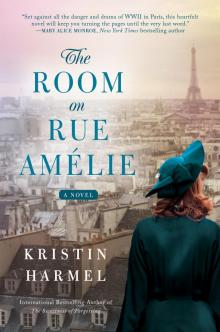 The Room on Rue Amélie
The Room on Rue Amélie The Winemaker's Wife
The Winemaker's Wife The Forest of Vanishing Stars
The Forest of Vanishing Stars The Book of Lost Names
The Book of Lost Names Italian for Beginners
Italian for Beginners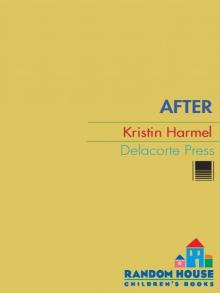 After
After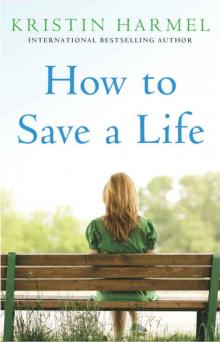 How to Save a Life
How to Save a Life The Blonde Theory
The Blonde Theory The Sweetness of Forgetting
The Sweetness of Forgetting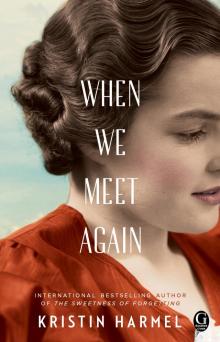 When We Meet Again
When We Meet Again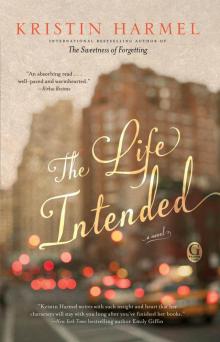 Life Intended (9781476754178)
Life Intended (9781476754178)